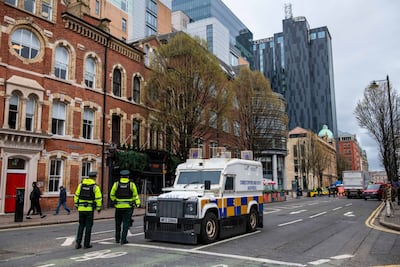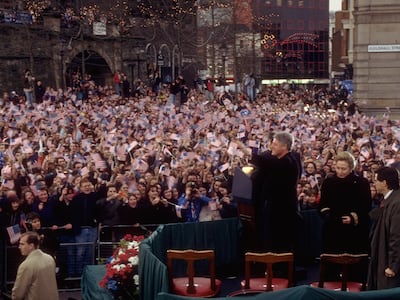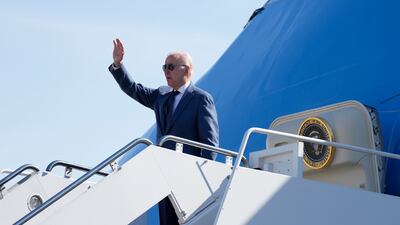US President Joe Biden is spending less than a day in Northern Ireland before his three-day homecoming in the south — so he can hardly complain if he has not made a huge splash in Belfast.
“Indifferent,” was one local’s take on the visit. “Which president is that?” asked another. The signs on bus stops, to be fair, spoke only of “a presidential visit”.
With a late-evening arrival on Tuesday, heavy rain forecast and a single engagement behind an Ulster University security cordon on Wednesday, few in Belfast will see much of Mr Biden.
“Maybe when president [Bill] Clinton came over, more people would have come out,” said pastor Paul Donnelly, 56.
“I don’t think President Biden has got that same type of appeal.”
Four suspected pipe bombs have been recovered from a cemetery in Creggan near Derry in Northern Ireland, police said on Tuesday, after a weekend of security warnings.
The presidential visit has led to road closures and a large armed police presence in Belfast’s city centre. Small protests are planned by those who oppose Mr Biden’s foreign policy.
Petrol bombs thrown in Derry on Monday were a reminder of the lingering threat. Football fans were disgruntled when the massive police operation for Mr Biden forced a Tuesday fixture to be postponed.
“Frankly I expect there are many people who will be much more interested in the football than anything the US President says,” said Ron McDowell of the Traditional Unionist Voice party.

Beyond these practical grumbles, there is a feeling that the impasse in Northern Irish politics puts a dampener on a trip billed as celebrating the “tremendous progress” since the 1998 Good Friday Agreement.
Although the violence of The Troubles has largely subsided, power-sharing has been fraught and the Northern Ireland Assembly has not sat for over a year during the latest breakdown in relations.
“If the assembly had been working, he [Mr Biden] would have stayed, he would have talked to them,” said retired consultant Hugh Neeson, 73.
“But what’s the point? They’re not there.”
In the mainly Protestant camp that supports Northern Ireland’s union with Britain, many are wary of the Catholic Mr Biden and suspect he favours a united Ireland. The phrase “Sleepy Joe” has crossed loyalist lips.
For those who celebrate Mr Biden’s Irish roots, his stay in the Republic will be the main event — with flags and posters awaiting him in the south — and not his brief stop in Belfast.
While the Republic speaks of “welcoming a great Irish-American President home”, the UK government has had to deny that Mr Biden’s brief stop in Belfast was a snub.
Ulster University president Prof Paul Bartholomew, who said the Belfast campus being visited by Mr Biden “reflects the hope and promise of the agreement”, was one of the few getting excited.

“It can be a bit pompous, can't it?” Nitai Prabhu, 67, a member of a Hindu temple in Belfast, said of the presidential trip.
Like others who remembered the days of explosions and army barracks in Belfast, he said times had at least changed since the height of The Troubles.
The arrival of foreign students and migrants to Northern Ireland “gives you a bit of a different perspective from the Catholic and Protestant considerations”, he said.
One 32-year-old local who asked not to be named said some of his earliest memories were of barricades around Belfast’s city centre that were meant to stop bombs coming in.
Although metal fences known as “peace walls” still divide parts of Belfast, people come and go in the centre as they would on any UK high street.
“There’s definitely a normality that there never was before. Most people are just absorbed with their everyday cares,” said Mr Donnelly.
“There’s economic benefits now that there weren’t, say, 40 years ago. People can tolerate each other when there’s mutual prosperity.”


